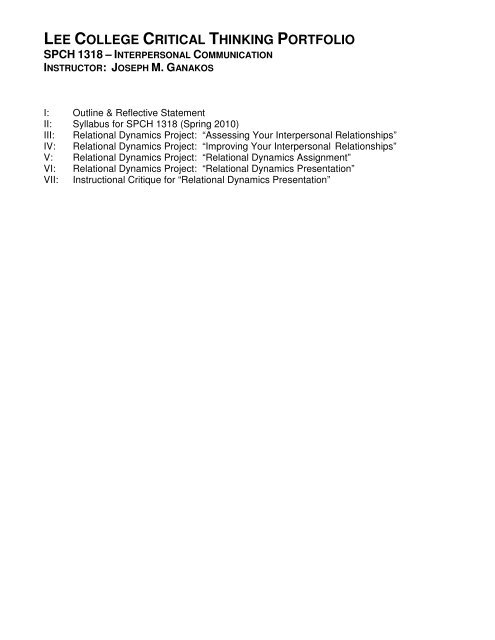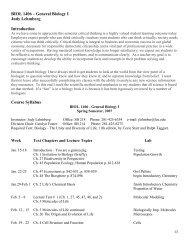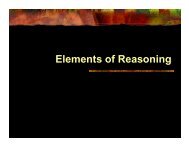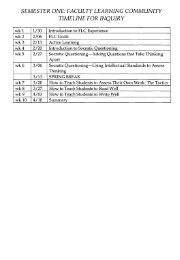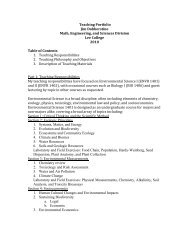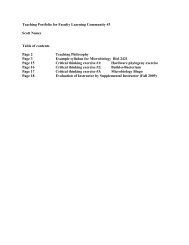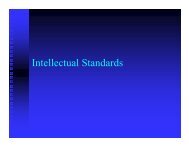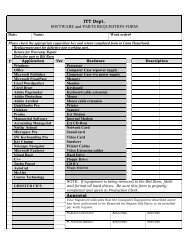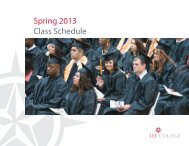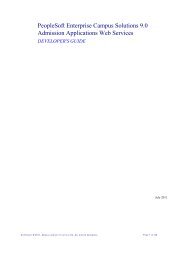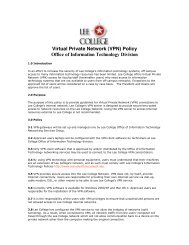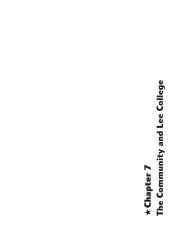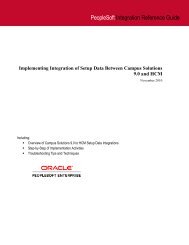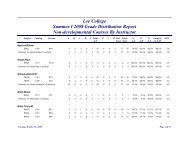interpersonal communication - Lee College
interpersonal communication - Lee College
interpersonal communication - Lee College
Create successful ePaper yourself
Turn your PDF publications into a flip-book with our unique Google optimized e-Paper software.
LEE COLLEGE CRITICAL THINKING PORTFOLIO<br />
SPCH 1318 – INTERPERSONAL COMMUNICATION<br />
INSTRUCTOR: JOSEPH M. GANAKOS<br />
I: Outline & Reflective Statement<br />
II: Syllabus for SPCH 1318 (Spring 2010)<br />
III: Relational Dynamics Project: “Assessing Your Interpersonal Relationships”<br />
IV: Relational Dynamics Project: “Improving Your Interpersonal Relationships”<br />
V: Relational Dynamics Project: “Relational Dynamics Assignment”<br />
VI: Relational Dynamics Project: “Relational Dynamics Presentation”<br />
VII: Instructional Critique for “Relational Dynamics Presentation”
LEE COLLEGE CRITICAL THINKING PORTFOLIO<br />
OUTLINE & REFLECTIVE STATEMENT<br />
SPCH 1318 – INTERPERSONAL COMMUNICATION<br />
INSTRUCTOR: JOSEPH M. GANAKOS<br />
INTRODUCTION & REFLECTIVE STATEMENT<br />
Since 2006, SPCH 1318 has been taught at <strong>Lee</strong> <strong>College</strong> with an annual census of approximately<br />
200 students over ten sections taught throughout the academic year. Interpersonal<br />
Communication is a class used to satisfy the “oral <strong>communication</strong>” requirement for <strong>Lee</strong> <strong>College</strong><br />
and the State of Texas and is often preferred by certain majors due to its greater applicability in<br />
certain workplaces. Nursing, CAD, and many of the vocational majors are often better served<br />
through the elements of this class than by other Speech Communication offerings.<br />
As SPCH 1318 is taught both in both traditional (face-to-face, on-campus) and hybrid (a<br />
composite of traditional and online instruction) courses, it was necessary to design assignments<br />
that could be delivered easily in either environment. By creating an assignment that is sequential,<br />
incremental and results in a capstone experience, the Relational Dynamics Project that I have<br />
designed integrates not only the academic content demanded by this subject area but seeks to<br />
include a significant critical thinking component in order to enhance the student’s experience and<br />
to provide an opportunity for significant self-evaluation.<br />
By creating an assignment that demonstrates real-world applications for theoretical concepts,<br />
students will not only have a greater understanding of the material but be able and willing to apply<br />
these learnings across the curriculum and their own lives.<br />
PROCESS<br />
Students will undertake a semester-long project that will result in multiple learning outcomes and<br />
seeks to integrate all the primary learning objectives covered through lecture, readings and<br />
classroom interaction. Additionally, by utilizing several key elements of the Paul-Elder Critical<br />
Thinking Framework, it is incumbent upon the student to not only report the existence of<br />
<strong>interpersonal</strong> phenomena but to seek to explain those same phenomena through theoretical and<br />
practical analysis and application.<br />
In the initial phase of the assignment (“Assessing Your Interpersonal Relationships”), students will<br />
experience four distinct critical thinking elements: Purpose, Problem, Empirical Evidence and<br />
Assumptions. They will be asked to analyze three real world relationships and draw some<br />
preliminary conclusions based on the data they gather through subjective and objective questions.<br />
In the second phase of the assignment (“Improving Your Interpersonal Relationships”), students<br />
will take the data they gathered in the previous phase and begin to analyze the relational<br />
dynamics of each relationships and begin to compare and contrast each relationship. By doing<br />
so, the students should experience the same four critical thinking elements from the first phase as<br />
well as engaging in the designation and understanding of a Frame of Reference.<br />
Taking the sum of the information gathered in the first two phases, they will create a 3-4 page<br />
subjective analysis of the relationships in the third component of the assignment. In this phase,<br />
they will apply a minimum of four a priori questions dealing with seminal issues from the course<br />
material to all three relationships. In so doing, they will apply the critical thinking elements of<br />
Conceptualization and Inferences in addition to the previous five critical thinking elements.
Finally, the students will design a capstone presentation (a 13-14 minute speech) that will take all<br />
the relational data gathered over the three previous assignments and use them in an experimental<br />
process by which a major theory (Maslow’s Hierarchy of Needs, Knapp’s Stages of Relational<br />
Development, Altman & Taylor’s Social Penetration Model, etc.) is used to not only explain the<br />
relational data but be used as a tool for the exploration, understanding and maintenance of each<br />
relationship. In this final phase of the assignment, not only will students utilize all seven of the<br />
previously applied critical thinking elements but include the eighth and final element: Implications.<br />
By creating a process-driven assignment that spans 90% of the total class time, it is my belief that<br />
students will not only have a working knowledge of the fundamentals of critical thinking but be<br />
able to replicate the analytical functions of this process in relationships beyond those studied in<br />
this assignment.
INTERPERSONAL COMMUNICATION<br />
SPCH 1318 SPRING 2010<br />
INSTRUCTOR CONTACT INFORMATION:<br />
Instructor: Joseph M. Ganakos, M.A. Office Phone: (281)425-6502 (x6502)<br />
Office:<br />
Advanced Technology Center<br />
ATC 303<br />
Office Hours:<br />
Please see instructors website or<br />
the hours posted on my office door.<br />
Instructor’s E-mail: jganakos@lee.edu Instructor’s Webpage: www.lee.edu/faculty_pages/<br />
Division Chair:<br />
Ray Whitlow<br />
Office Phone:<br />
Office:<br />
(281)425-6876<br />
Gym 107<br />
Division Secretary:<br />
Beth Barclay<br />
Office Phone:<br />
Office:<br />
(281)556-4003<br />
Gym 103<br />
WELCOME TO:<br />
Course Title: Interpersonal Communication<br />
Course Number: SPCH 1318<br />
Credit Hours: 3<br />
Course Sections:<br />
M/W 12:15-1:30 (1475)<br />
M/W 7:15-8:30 (1476)<br />
T 5:45-8:25 (1477)<br />
COURSE OVERVIEW:<br />
Catalog Description: Interpersonal Communication focuses on the complex process of person-to-person <strong>communication</strong>. The<br />
course is designed to facilitate the student's conscious awareness of the impact of messages, verbal and nonverbal, sent and<br />
received by him/her.<br />
Course Learning Outcomes: This course is designed to help you:<br />
• Recognize and apply effective listening skills.<br />
• Recognize and interpret nonverbal messages.<br />
• Analyze and interpret one's own personal verbal and nonverbal messages.<br />
• Recognize and demonstrate appropriate emotions and feelings in a variety of <strong>communication</strong> situations.<br />
• Be able to use assertive behavior for appropriate settings.<br />
• Be able to skillfully deal with conflict situations.<br />
• Recognize the importance culture plays in <strong>interpersonal</strong> <strong>communication</strong>.<br />
• Explain the concepts in <strong>communication</strong> theory.<br />
• Illustrate the perception process.<br />
• Define the self-concept and its relationship to <strong>communication</strong>.<br />
• Cite examples of effective and ineffective relationships.<br />
Required Materials: The required text for this course is Looking Out, Looking In by R.A. Adler & N. Towne, 12 th Ed.<br />
You are expected to keep current in the reading of the text, even if chapter material is not directly covered in class. Exams<br />
will be drawn primarily from the textbook and lecture.<br />
Please note: read the required material prior to class! Cramming right before we begin is of little use. I will ask you to keep your<br />
textbooks closed while I am lecturing; I want to know what you think, not what the authors think.<br />
Additionally, I would urge you to purchase a three-ring binder to keep your syllabus, handouts and notes in; you will be required to<br />
have them in ALL classes. You should also purchase a pack of 3x5 white note cards for use in your presentation.
CLASS POLICIES:<br />
Attendance: Attendance is required. You are allowed one excused absence. For each absence, 50 points will be deducted from<br />
your final total possible score. It is your responsibility to cover any and all material missed and to turn in any assignments that may<br />
have been due on the day you were absent. Under no circumstances will absences on speech days be excused except in the<br />
most extreme (and sufficiently documented) cases. This policy extends to those days where your classmates may be presenting<br />
their work even if you are not.<br />
An excused absence that is the result of a scheduled, sanctioned <strong>Lee</strong> <strong>College</strong> activity must be accompanied by prior notice and<br />
supporting authorization from the activity sponsor. Tests and non-speech assignments must be made up within one week of the<br />
absence. All speeches must be delivered the class preceding the absence or at a time mutually agreed upon.<br />
You are considered tardy if not present when class begins (one second, one minute, or one hour … tardy is tardy) or if you leave<br />
class before it is finished. The first two tardies will equal one absence; every tardy thereafter will then be treated as an absence. If<br />
you are late to class and miss a quiz, you are not allowed to take a make-up quiz or assignment/exercise. A tardy may be excused<br />
if approved in advance at my discretion.<br />
Assignments: Assignments are to be submitted at the beginning of class, not during the middle or end of class. If you will be<br />
absent the day an assignment is due, make arrangements ahead of time to have it to me prior to the due date. Late work will be<br />
accepted, but you lose 25% of the base score per class session (or portion thereof including tardy attendance). Thus, if the<br />
assignment is two class sessions late, even if your work earns an “A”, you will only receive an “F” based on this deduction. If you<br />
have a valid reason for the work being late, such as documented serious illness or a verifiable family emergency, the work must be<br />
handed in the class session you return or else it becomes late work.<br />
Submission of Assignments: All assignments must be typed and spell-checked. On these assignments, please use standard<br />
(1”) margins, 12 pt. font (Arial or Times New Roman are good choices), and double spacing. All assignments must follow a major<br />
citation methodology if appropriate (APA or MLA only). Cover pages are optional. Multi-page assignments must be stapled … not<br />
paperclipped, not folded over; invest in a stapler … trust me on this one. I realize all of this sounds anal retentive but you’d be<br />
surprised how many people think 3” margins and 20 pt. font are a good idea. Assignments submitted that fail to meet one or more<br />
of these guidelines will be subject to a 25 point penalty. Handwritten assignments will not be accepted under any circumstances<br />
unless I have specified this in advance (in-class quizzes, etc.). Also … get in the habit of saving all your assignments to disk; you<br />
never know when you’ll need them again.<br />
If you need assistance in creating and editing written assignments (including speeches), please make use of the Writing Lab in<br />
Bonner Hall 225 at (281)425-6534.<br />
Behavioral Expectations During Presentations: You are expected to be present and on-time on days presentations are<br />
scheduled. Anyone who is not present, with the appropriate critique sheet, at the beginning of the class period will receive a 25%<br />
penalty to their presentation grade.<br />
Additionally, you should refrain from any activity that may jeopardize the grades of your classmates during presentations. If you<br />
are late and walk in the door during another student’s presentation you will receive no credit (zero) for your own presentation;<br />
please wait outside until the instructor admits you to the classroom. Also, please refrain from any activity other than listening to the<br />
speaker while you are an audience member (going over your notecards, eating or drinking, whispering to one another, etc.) that<br />
may distract other students.<br />
The same penalty of no credit (zero) will occur should you not deactivate your cellphone/pager/etc. per the syllabus guidelines.<br />
Make-up Exams & Speeches: If you miss an exam you must provide valid/verifiable documentation excusing your absence;<br />
otherwise you will not be allowed to make up the exam. Also bear in mind that a make-up exam will typically be harder than the<br />
original exam. The Final Exam must be taken at the specified time as it will be impossible to schedule a make-up exam.<br />
Due to time constraints, make-up speeches will only be granted, at my sole discretion, in the most extreme circumstances. Prior<br />
notice of an absence is absolutely mandatory to receive this consideration.<br />
Sources and Research: Several of your assignments may require you to conduct outside research. You will have a minimum of<br />
required sources provided to you during the preparation phase of each assignment. Failure to provide the minimum of sources will<br />
result in you receiving a grade no higher than a ‘D’ on your assignment. I will strictly enforce this rule.<br />
Please note: while the internet provides many wonderful things (ESPN.com Fantasy Football, MP3s from Emule, Yahoo Games,<br />
etc.) is a very scary place when it comes to research. Any nutcase can make a website; just because you can Google it doesn’t<br />
mean it is credible. I will expect your research to go beyond internet citations and actually enter into the world of credible sources.<br />
Oh … and just for future reference. Wikipedia and About.com are not appropriate sources. Seriously.<br />
Quizzes: Daily Quizzes will be unannounced. They will usually be based on the reading assignment or on the previous day’s<br />
lecture. Quizzes may not be made up under any circumstances; if you miss a quiz, you will receive no credit.<br />
Participation: Participation in any class is preferred; in a <strong>communication</strong>s course it is essential. However, I do evaluate you on<br />
the quality of your participation, not the quantity. There will be opportunities in class to earn points … don’t waste them.
Cell Phones and Beepers: Please silence all cell phones and beepers. I, too, have a cell phone; please note that it will not be<br />
heard while class is in session. If your cell phone or beeper disturbs the class, 50 points will be deducted from your participation<br />
grade per disturbance and my eternal wrath. And, just to clarify: “off” does not mean on vibrate with the occasional covert glance<br />
to see if someone is thinking about you … it means completely and utterly silent.<br />
Also, please refrain from text messaging during my class as the same penalty will apply for this transgression … yes, your<br />
surreptitious glances and key-tapping isn’t nearly as unnoticed as you think. Any violation of this policy will result in a 50 point<br />
deduction from your participation score and … you guessed it, my eternal wrath.<br />
Moreover, please refrain from wearing Bluetooth headpieces while in class.<br />
Limited exceptions for cellphones will be made in emergency situations; please discuss this with me prior to the beginning of class.<br />
Phones are not allowed to be accessed during exams, quizzes or presentations for any reason whatsoever; they must remain in<br />
your backpack, pocket or purse. Failure to abide by this policy will result in an immediate zero on the exam, quiz or presentation.<br />
Internet and E-mail: <strong>Lee</strong> <strong>College</strong> provides computing resources to all students. You are encouraged to use the computers,<br />
software packages, and e-mail for educational and/or paraprofessional activities. If you don’t have a computer or internet access<br />
you may make use of the Open Computer Lab in ATC 208.<br />
You must utilize and maintain the e-mail account via <strong>Lee</strong> <strong>College</strong> that was provided to you at the time of registration. It is, by far,<br />
the most efficient means of getting in touch with me (and vice versa) and it is completely free of charge. Your MyLC account will<br />
be the only account I will recognize for your incoming e-mails; similarly, I will only distribute all mail to your MyLC accounts.<br />
Any e-mails sent to me must include your class section number within the subject line of the e-mail (ex: “1552 - My Speech”).<br />
Also, please include a “signature” consisting of your proper name at the conclusion of your e-mail.<br />
Yes, I understand that you can’t live without your Hotmail, GMail or Yahoo accounts but it is time to realize that<br />
Sk8trgurl@yahoo.com or TexanFan69@hotmail.com isn’t really the image you want prospective employers (and instructors) to<br />
judge you on.<br />
Also, as a quick aside: Get in the habit of spellchecking your e-mails and be conscious of proper grammar and punctuation<br />
(including capitalization). Remember that it is not what you do but what you look like you do … if your e-mail makes you appear<br />
incompetent or careless then, for all intents and purposes … you are.<br />
Faculty Website & Student Handouts: Over the course of the semester you will be required to print assignments from my faculty<br />
website. These handouts are due (per the attached course calendar) and may be used not only for exams and assignments but<br />
may be required as an in-class quiz. Please print them out for the night they are due.<br />
Look under “Course Material” to find your course number. A copy of this syllabus will be found under “Class Outline”. All handouts<br />
will be listed under “Study Guides”. All assignments will be listed under “Assignments”. Helpful links (especially those used to help<br />
you in your research) will be found under “Class Web Links”.<br />
WiFi Laptops: If you choose to bring a laptop to class, I strongly urge you to utilize it only to aid you in taking notes. If you choose<br />
to surf the Internet or play games during class you will do so at your own risk. If I determine that your use of a laptop acts as a<br />
distraction to the class in any way I will ask you to use a more conventional form of taking notes.<br />
Grading Scale: A = 100 – 90 B = 89 – 80 C = 79 – 70 D = 69 – 60 F = 59 – 0<br />
Grade Determination:<br />
Your grade will be<br />
determined by<br />
the following:<br />
Details<br />
Point Value<br />
Percent of<br />
Final<br />
Average<br />
Exam I, II & III In-class, equally weighted at 10% Each 300 30<br />
Jung Typology Assignment Personality Typing Assignment & Questions 50 5<br />
Relational Dynamics Project Critical Thinking Assignment 100 10<br />
Reflection Papers Material Competency Assignment 100 10<br />
Final Presentation Capstone Theory & Analysis Assignment 250 25<br />
Quizzes/Participation Quizzes, in-class exercises and participation. 200 20<br />
TOTAL: 1000 100%
LEE COLLEGE POLICIES:<br />
Academic Integrity: <strong>Lee</strong> <strong>College</strong> is committed to a high standard of academic integrity in the academic community. In<br />
becoming a part of the academic community, you are responsible for honesty and independent effort. Failure to uphold these<br />
standards includes, but is not limited to, the following: plagiarizing written work or projects, cheating on exams or assignments,<br />
collusion on an exam or project, and misrepresentation of credentials or prerequisites when registering for a course.<br />
Cheating includes looking at or copying from another student's exam, orally communicating or receiving answers during an<br />
exam, having another person take an exam or complete a project or assignment, using unauthorized notes, texts, or other<br />
materials for an exam, and obtaining or distributing an unauthorized copy of an exam or any part of an exam.<br />
Plagiarism is defined as submitting/presenting information drawn from the work of another as his/her own the ideas (without<br />
giving proper citation and/or attribution to the original source.). Plagiarism includes submitting a paper, report or project that<br />
someone else has prepared or extensive reliance upon non-cited material within the format of a speech.<br />
Collusion is inappropriately collaborating on assignments designed to be completed independently. This may include, but not<br />
be limited to, take-home assignments, take-home tests, in-class quizzes, research papers, etc.<br />
These definitions are not exhaustive. When there is substantial evidence of cheating, plagiarism, collusion or<br />
misrepresentation, disciplinary action may include but is not limited to: requiring you to retake or resubmit an exam or<br />
assignment, assigning a grade of zero or "F" for an exam or assignment; or assigning a grade of "F" for the course. Additional<br />
sanctions including summary withdrawal or expulsion may be imposed on anyone who violates the standards of academic<br />
integrity.<br />
Americans with Disabilities Act Statement: <strong>Lee</strong> <strong>College</strong> is dedicated to providing the least restrictive environment for all<br />
students. The Vocational Rehabilitation Act of 1973, Title V, Section 504 and the Americans With Disabilities Act of 1990<br />
(ADA)<br />
enable students with disabilities to participate in and benefit from all post-secondary educational activities.<br />
If you require reasonable accommodations because of a physical, mental, or learning disability, please contact Disabled<br />
Student Services in Moler Hall at (713)425-6384 who will provide you with the procedures you must follow to request<br />
accommodations. Please notify me as soon as possible (preferably before the end of the first two weeks of class) to arrange<br />
for reasonable accommodations.<br />
Equal Opportunity Statement: It is the policy of the <strong>Lee</strong> <strong>College</strong> to provide equal employment, admission and educational<br />
opportunities without regard to race, color, religion, national origin, sex, age, or disability. <strong>Lee</strong> <strong>College</strong> strives to provide an<br />
excellent learning environment free from harassment or intimidation directed at any person’s race, color, religion, national<br />
origin, sex, age, or disability. Any form of harassment will not be tolerated. If any issues arise please feel free to discuss<br />
these matters with me as necessary.<br />
Withdrawal Policy: Withdrawal from the course after the official day of record and prior to last day for withdrawal will result in<br />
a final grade of “W” on your transcript. No credit will be awarded for a course earning a “W”. If you stop attending class, you<br />
must withdraw at the registration office prior to “W” day. If you stop attending class and do not officially withdraw, you will<br />
receive an “F” for the course.<br />
GRADING CRITERIA FOR CAPSTONE ASSIGNMENTS:<br />
Relational Dynamics Project: A report using assigned criteria to analyze various relationships in your life. The data from<br />
this project will be used to provide you with the material necessary to deliver the Relational Dynamics Presentation to your<br />
classmates. You will undertake a comprehensive assessment of three of your past or present relationships and then<br />
undertake a process-driven critique of those relationships using selected readings from the semester’s course materials.<br />
Please reference the handout “Relational Dynamics Assignment” located on my faculty website for full details on this project..<br />
Relational Dynamics Presentations: A brief speech designed to inform the audience about the impact of active relational<br />
evaluation and management techniques in various real-life relationships. The student must use Powerpoint as your visual aids<br />
of choice to supplement your presentation. The length of the speech will be 13 - 14 minutes. More detailed instructions will<br />
be issued at the time of assignment. Please reference the handout “Relational Dynamics Presentation Overview” located on<br />
my faculty website.<br />
Reflection Papers: You will prepare a one-page analysis and critique of the material in each chapter as it applies to the<br />
relationships in your life. You are expected to use personal examples to frame your answers. I will select four random<br />
chapters to be collected on a date to be specified in-class. You are urged to keep up with your reading and to prepare each<br />
Reflection Paper immediately after completing it. More detailed instructions will be issued at the time of assignment.
INTERPERSONAL COMMUNICATION<br />
SPCH 1318 SPRING 2010<br />
SYLLABUS CONTRACT<br />
I have read and understand all of the requirements and responsibilities set forth by this syllabus. I am fully aware of all the<br />
assignment requirements and expectations, the expectations for attendance and behavior, general performance and grade<br />
expectations, and the policies regarding cheating and plagiarism.<br />
Further, I understand that the class Calendar may be subject to change by the instructor as conditions warrant. Should any<br />
substantive changes occur, the instructor will provide a revised Calendar to the class.<br />
Finally, I agree that this syllabus will act as a compact between instructor and student and that I will abide by all the<br />
expectations outlined therein.<br />
____________________________________ ____________________________________ _________________<br />
Printed Name Signature Date<br />
This signed document must be submitted to the instructor at the beginning of the second day of class.
INTERPERSONAL COMMUNICATION - SPCH 1318<br />
ASSESSING YOUR INTERPERSONAL RELATIONSHIPS<br />
Purpose: 1. To understand how <strong>communication</strong> events are guided by the context in which the event<br />
occurs.<br />
2. To understand how different contexts affect the individuals in a relationship differently.<br />
3. To determine the degree of “<strong>interpersonal</strong>ness” of your relationship.<br />
Directions:<br />
Select one relationship in each of the following categories:<br />
First: professional or academic<br />
Second: immediate family or extended family<br />
Third: romantic or friendship<br />
1. First Relational Partner: _______________________ (First Name & Type)<br />
Second Relational Partner: _______________________ (First Name & Type)<br />
Third Relational Partner:<br />
_______________________ (First Name & Type)<br />
2. For each relationship, complete the following items below using the following scale:<br />
5 = Definitely True 2 = Mostly False<br />
4 = Mostly True 1 = Definitely False<br />
3 = Neither True Nor False<br />
QUESTION<br />
PARTNER<br />
1<br />
PARTNER<br />
2<br />
PARTNER<br />
3<br />
My partner and I use psychological information as the basis for predicting each<br />
other’s responses.<br />
I have a high degree of trust and a positive history with my partner.<br />
Most of the rules we use for communicating in our relationship are unique to our<br />
relationship.<br />
Our roles in the relationship are defined almost exclusively by our individual<br />
characteristics.<br />
Our goals for communicating include the satisfaction of both personal and mutual<br />
needs.<br />
TOTAL<br />
The possible range of your score is 4 - 25, indicating degrees of “<strong>interpersonal</strong>ness.” Scores of 15 and lower lean<br />
toward non-<strong>interpersonal</strong>, while scores of 16 and higher lean toward <strong>interpersonal</strong>.<br />
ASSESSMENT QUESTIONS<br />
• Is one of your relationships more <strong>interpersonal</strong> than the others? In what ways?<br />
• Is one of your relationships less <strong>interpersonal</strong> than the others? In what ways?<br />
• How does the other person’s cultural background affect how he/she responds to you and your<br />
messages?<br />
• How do the situation and the environment affect how you and your partner communicate your messages?<br />
• How does the content and/or the way the messages are communicated change due to the place and the<br />
surroundings in which you are communicating?<br />
• What are some techniques that we’ve discussed in class that will help you improve your <strong>interpersonal</strong><br />
relationships? Be specific with regard to their application.
INTERPERSONAL COMMUNICATION - SPCH 1318<br />
IMPROVING YOUR INTERPERSONAL RELATIONSHIPS<br />
Purpose:<br />
Directions:<br />
1. To identify positive and negative <strong>communication</strong> traits you exhibit.<br />
2. To establish an understanding of those traits.<br />
3. To determine if the positive traits can be maintained or amplified.<br />
4. To determine if the negative traits can be diminished or eliminated.<br />
Using the three relationships you chose for the Interpersonal Communication Assessment,<br />
complete the following exercises.<br />
Professional/Academic Partner: _______________________ (First Name & Type)<br />
Family Partner:<br />
_______________________ (First Name & Type)<br />
Romantic/Friendship Partner: _______________________ (First Name & Type)<br />
ASSESSMENT QUESTIONS<br />
The following questions are to assist you in clarifying your thoughts prior to the final exam, reflection papers and<br />
your capstone presentation. I would advise you to answer each one fully and annotate with proper sourcing for<br />
external sources. The responses from this assignment will be submitted as your Relational Dynamics Report.<br />
1. Which relationship was the most A<strong>interpersonal</strong>@? Trace the development of this relationship from its<br />
beginning to its current position based on Knapp=s Stages of Relational Development.<br />
2. Which relationship was the least A<strong>interpersonal</strong>@? Trace the development of this relationship from its<br />
beginning to its current position based on Knapp=s Stages of Relational Development.<br />
3. For each of the three relationships, establish a list of five basic rules that exist within each. Explain what<br />
would happen if these rules were violated. (Ex: trust, sense of humor, etc.; be creative and elaborate in<br />
defining these rules)<br />
4. Did the rules vary between relationships? If so, why? If not, why not?<br />
5. Why are these relationships significant to you? Use Maslow’s Hierarchy of Needs to analyze each.<br />
6. Are there any circumstances under which the most A<strong>interpersonal</strong>@ of your relationships would be<br />
terminated? If so, what? Explain in terms of the relational rules you defined in Question 3.<br />
7. Are you motivated to improve the least A<strong>interpersonal</strong>@ of your three relationships? If so, why would you<br />
do so and how would you choose to do it? If not, why not?<br />
8. Identify one area in each of the three relationship that needs improvement. How do you intend to alter<br />
your behaviors in order to achieve these improvements? Be specific and thorough.
RELATIONAL DYNAMICS ASSIGNMENT - SPCH 1318<br />
OVERVIEW<br />
You will complete two supporting assignments, in sequence, in order to help you undertake a<br />
critical analysis of three of your current or past relationships. First, you’ll need to complete the<br />
assignment “Assessing Your Interpersonal Relationships”. Next, you’ll then apply the<br />
learnings from this assessment to the assignment “Improving Your Interpersonal<br />
Relationships”. The data you gather using these two instruments will enable you to undertake<br />
a comprehensive review of the relational issues you encounter in your daily life.<br />
Utilizing this data, you will write a 3-4 page summary of your progress regarding the Relational<br />
Dynamics Assignment. Utilizing the information you gathered on the Interpersonal<br />
Relationship Assessment and the Interpersonal Improvement Report, you will create a succinct<br />
overview of the three relationships you’ve chosen utilizing at least four of the variables listed<br />
below.<br />
CONTENT<br />
Your summary must analyze ALL THREE RELATIONSHIPS and must include no less than<br />
four of the following variables:<br />
Self-Disclosure & Potential Alternatives to Self-Disclosure<br />
Conflict Resolution<br />
Needs Met by the Relationships<br />
Deception & Trust<br />
Gender or Socio-Cultural Differences<br />
Language & Listening Behaviors<br />
Your Self-Concept & Its Effect on Relationships<br />
Perceptual Sets & Barriers to Perception<br />
Managing with “Difficult Emotions”<br />
Communication Climates<br />
STRUCTURE & SOURCING<br />
Your summary must follow the guidelines for submission found in your syllabus. Please<br />
demonstrate evidence of a cogent thesis, proper transitions and a legitimate introduction and<br />
conclusion.<br />
Additional, ALL sources consulted must be cited using APA or MLA format.<br />
LEARNING OUTCOMES<br />
By examining these key variables, you’ll be better able to target your theory required for<br />
analysis in your Relational Dynamics Presentation. These variables should have universal<br />
application, regardless of which theory you’ve chosen as your unit of analysis. This<br />
assignment will now provide you with the necessary data to begin your Relational Dynamics<br />
Presentation.
RELATIONAL DYNAMICS PRESENTATION - SPCH 1318<br />
OVERVIEW<br />
Using the three relationships you selected in your Relational Dynamics Assignment, you will prepare an<br />
oral presentation that analyzes all three relationships using a major theory, model or definitional<br />
process from your readings over this semester. You will examine the similarities and differences<br />
between all three relationships and use this data to demonstrate the utility of theoretical analysis.<br />
CONTENT<br />
Be certain that you accomplish the following in your oral presentation:<br />
A brief overview of the theory you are using as your critical framework.<br />
A brief overview of each relationship; this may be done all at once or singularly in sequence.<br />
An application of the theory to each relationship.<br />
Demonstrate what the application of the theory reveals and how the theory is applicable for<br />
relational analysis.<br />
Some suggestions for theories would include: Knapp’s Stages of Relational Development, Duck's<br />
Filtering Theory of Attraction, Social Exchange Theory, Altman & Taylor’s Social Penetration Model,<br />
etc.<br />
Some critical issues for examination might include: relational progression, what needs are met by the<br />
relationship, how conflict is dealt with within the relationship, deception cues, etc.<br />
Areas of self-examination might include commonalties and differences in the relationships, tendencies<br />
towards repetitive behavior on your part of those of others, the positive or negative outcomes of these<br />
relationships, etc.<br />
STRUCTURE<br />
Your speech must have a cogent introduction and conclusion. The body of the speech will reflect the<br />
content criteria listed above. You must accomplish this task within the maximum of ten minutes of<br />
speaking time allotted per student.<br />
VISUAL AIDS<br />
You must use Powerpoint to help your audience understand your theory and its application. There is<br />
no minimum or maximum number of slides. Be certain that you follow the guidelines for spellchecking<br />
and grammar.<br />
DELIVERY<br />
You must employ an extemporaneous style of delivery. You are, however, allowed to use limited<br />
speaking notes.<br />
LEARNING OUTCOMES<br />
By applying a sound theory to these relationships, you’ll be better understand not only the theoretical<br />
perspective but the relationships you engage in as well.
INTERPERSONAL PRESENTATION CRITIQUE – SPCH1318<br />
Speaker’s Name: ___________________________<br />
Class Day/Time: _______________________<br />
Relationship 1: _____________ Relationship 2: _____________ Relationship 1: _____________<br />
Theory / Model / Definition Being Used: ________________________________________________<br />
CONTENT / ORGANIZATION<br />
Had clear & concise introduction.<br />
Had connecting transitions between points.<br />
Followed a logical organizational pattern.<br />
Speech clearly established the nature of the relationships.<br />
/30<br />
Speech clearly demonstrated relational significance.<br />
Had clear & concise conclusion.<br />
THEORY & ANALYSIS<br />
Speech demonstrated understanding of theory.<br />
Speech demonstrated application of theory.<br />
Speech demonstrated factors that justify use of theory.<br />
/40<br />
Analysis of relationships coincides with theory guidelines.<br />
Subjective concepts supported by properly cited sources.<br />
PRESENTATIONAL AIDS<br />
Visuals were legible (font size/color/etc.).<br />
Demonstrated both appropriateness and effectiveness.<br />
Met the minimum requirement for number and type.<br />
/10<br />
Used visuals appropriately.<br />
DELIVERY<br />
Gestures freely.<br />
Does not rely solely on manuscript.<br />
Maintains appropriate eye contact.<br />
/10<br />
Speech is free of hesitations / disfluencies.<br />
TIME LIMIT<br />
Met appropriate time requirements. _________ /10<br />
OVERALL COMMENTS:<br />
TOTAL SCORE: __________


